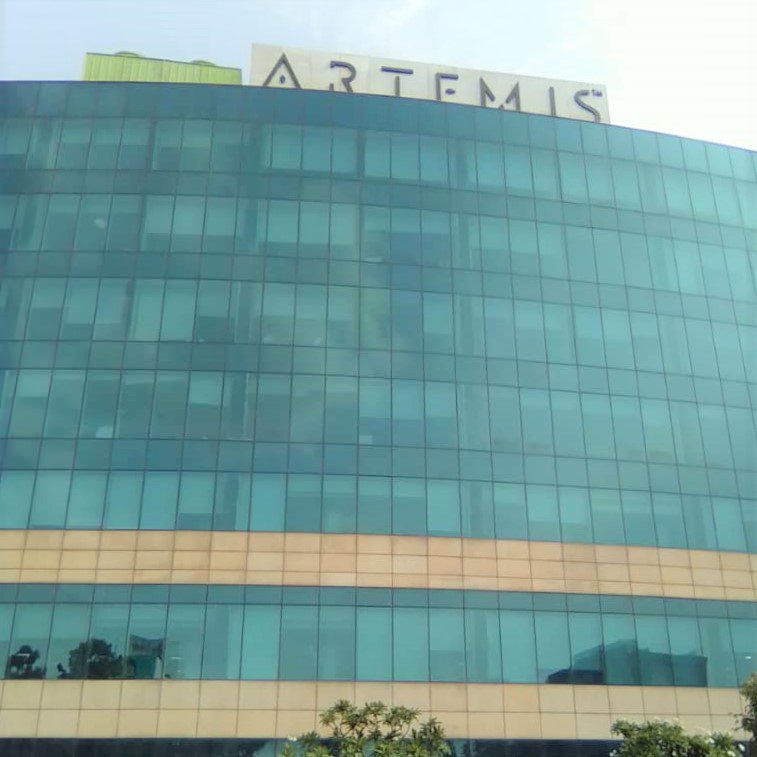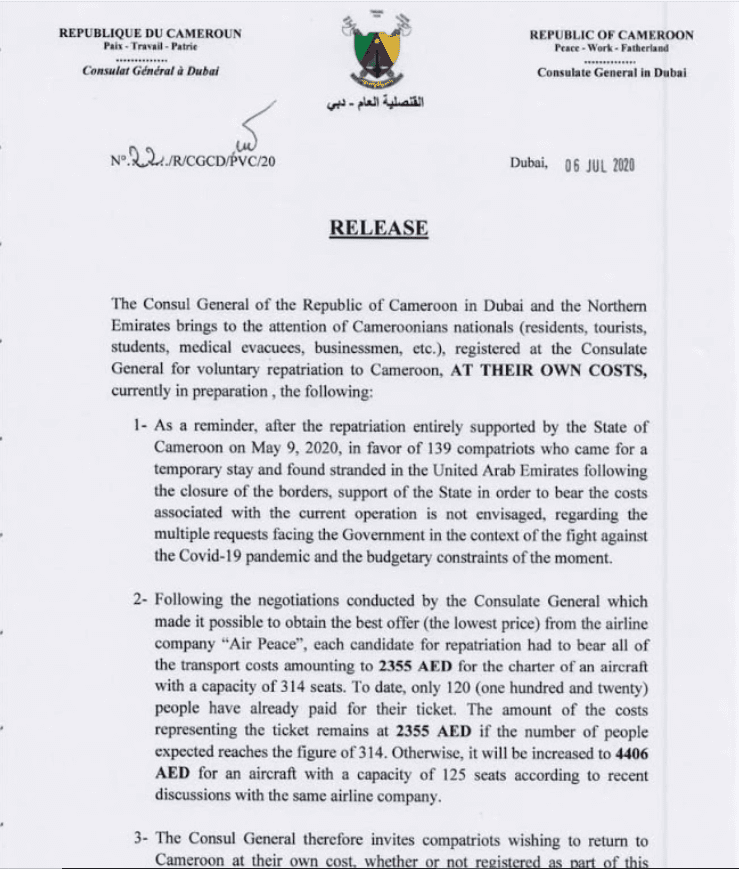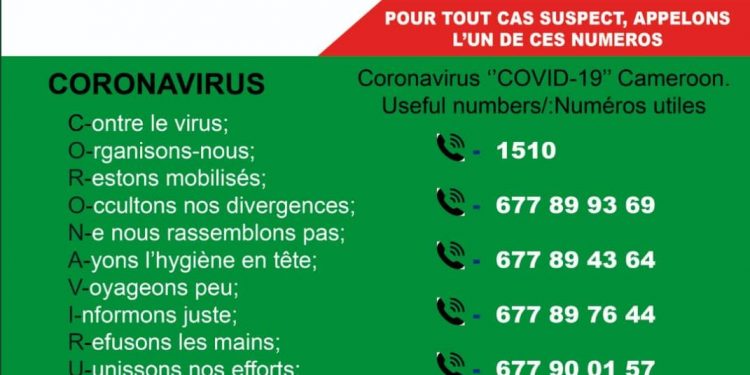The Coronavirus situation in Cameroon is getting worse with the rising number of infections. With contradicting data being shared by various government organisations, it has made Cameroonians sceptical of the real situation within the country and many carry-on like it is not happening by disregarding safeguards like wearing masks and respecting social distancing as advised.
MMI explored the situation further to understand the actions taken by the government to mitigate further spread, what has worked thus far and the shortcomings of the response by the government. How do we go from here?
Statistics
As of Friday, 17th July 2020, Cameroon’s Minister of Health, Dr Manaouda Malachie announced through a Tweet that Cameroon had 16,157 confirmed cases of Coronavirus, 13,728 recoveries and 373 deaths. The tweet suggests that there are some 2,056 active cases at the moment, with 386 people hospitalised under oxygen and 135,000 tests realised. The Minister called on all Cameroonians to respect social distancing measures in place and to wear masks at all times or stay at home for as long as possible to avoid potential Covid-19 patients from spreading the virus further.
This announcement came amid criticisms from the public – with some experts denouncing the response strategy. Many hold that the figures demonstrate that not enough testing is being done to determine the extent of infection of COVID-19 in the country.
Dr Albert Ze, General Manager at the Institute of Research for Health and Development (IRESADE) and recipient of the Cameroon Knight of the Order of Valour tweeted that if 135,000 tests were carried out as announced, then this means that approximately 5 tests per 1,000 inhabitants are conducted, which sums up to 1,000 tests per day since March 2020.
“The number of tests is far from sufficient to reflect the Coronavirus situation in the country,” added Dr Ze in his Tweet.
On his Facebook page where he shares his opinion on the situation of Cameroon’s health care system, he said: “the virus is obviously gaining grounds and the situation is getting worse. However, advanced figures cannot provide more information and cannot assist in decision making. As a reminder, an effective control strategy is based on reliable data with less bias.”
Borders
A tweet from Dr Malachie on 12th July 2020 said, any passenger visiting the country must have a COVID-19 negative test result certificate not older than 3 days. This came after the borders were recently opened and it has been announced that Air France, Brussels Airways and Ethiopian Airways are allowed to resume flights into Cameroon.
Dr Malachie has made efforts in keeping Cameroonians informed over Twitter on the situation with COVID-19 in the country since the first case was detected in early March. Some have, however, criticised this move citing that over 70 per cent of Cameroonians are not on Twitter.
The Yaounde government has equally come under fire for failing to close the country’s borders early enough. With knowledge of how the informal economy operates given that over 60 per cent of the country operates in this sector, Cameroonians understood the futility of a full-scale lockdown not accompanied by financial and food assistance from the government. It would be an impossible task for the Cameroon government to realise. This explains why the border closure against the first case getting in was vital to the rest of the nation.
The wait was not long before flights from high-risk countries in Europe were allowed into the country and with it, passengers who had Coronavirus entered the country. Dr Malachie confirmed in this Tweet on 20th March 2020 that 27 cases which tested positive had been brought in by flights from countries at risk.
COVID-19 Response Efforts
Cameroon benefited from some of the COVID-19 kits donated to Africa by the Chinese billionaire, Jack Ma of Alibaba. The renowned businessman announced on 16th March 2020, the donation of 100,000 masks, 20,000 test kits, 201,000 sets of protective clothing and face shields, 500 ventilators, 2,000 thermometers, one million swabs and extraction kits, and 500,000 gloves to each of the 54 nations on the African continent. These were flown in by Ethiopian Airways.
With the steady increase in the number of Coronavirus cases, Dr Malachie shared that the government had adopted the 3T (Track, Test & Treat) strategy to deal with the pandemic within the country. In densely populated cities such as Douala and Yaoundé where more cases are reported, the government has set out to build centres for the care of patients. One of the biggest has been built at the Mbappe Leppe stadium in Douala, which will act as a specialised centre for COVID-19 patient care. There is another specialised centre in Yaoundé at the Annex Military Stadium. In Yaoundé’s ORCA Annex Patient Care Centre, the capacity is 300 beds. As part of the response, a capacity-building exercise was conducted for staff from the 11 health districts in the Centre Province. It was meant to decentralise the response, said Health Minister Dr Malachie.
Both the Douala and Yaoundé stadia care centres have had purpose-built toilets. In Buea, the capital of the South West Region, there are campaign mobile vans deployed to provide COVID-19 screening. The Laquintinie Hospital in Douala has updated facilities to provide specialised care for COVID-19 patients. There are other specialised care centres set up in Ebolowa in the South Region and Bertoua in the East Region.
As much as the government has taken some steps in the right direction to handle the COVID-19 outbreak, most Cameroonians think that preventive measures such as closing the borders early enough were a missed opportunity to nip the spread of this virus in the bud. This was followed by a series of other mishaps such as an inconsistent decision-making process.
The Inactive Scientific Commission
When the Coronavirus hit Cameroon, the government created the Scientific Council for Public Emergency on 27th March 2020 to manage the COVID-19 crisis. It was tasked with informing the public on how to protect themselves against Coronavirus. Dr Ze in this Facebook post decries the inaction of the Scientific Council and said it is, “… a ghost institution that has not produced any proposals from the beginning until it was called upon to respond on a funeral issue.”

Frontline Health Staff and Patients
Before the rapid testing kits were donated to Cameroon, all the COVID-19 tests were processed in one laboratory in the entire country – Centre Pasteur du Cameroun based in Yaoundé. Medical staff in Cameroon have decried the lack of protective clothing and masks at hospitals. The lack of personal protective equipments being provided has pushed them to resort to self-protective measures; which is, rejecting patients suspected of having COVID-19.
Most staff flee when patients suspected of Coronavirus come for treatment. Patients have criticised hospitals for treating them poorly and for not attending to them when they are suspected of Coronavirus. In some cases, hospitals have turned this into a money-making business where they force staff to pay extra money to get tested.
The government maintains that COVID-19 consultations are free but most patients report that this has not been their experience at hospitals. They have been asked to pay for tests.
There have been allegations by those who visited the hospitals that some doctors or health staff have tried to force them to sign documents saying they were diagnosed with Coronavirus when they came in with different illnesses.
Most Cameroonians are wondering why there is a push to declare most people as being COVID-19 positive and then announced as cured. This is something that has been put down to strategic failures as detailed by Dr Ze in an interview to Deutsche Welle where he mentions that Cameroonians are suspicious of the authorities’ motives, given that the numbers do not add up as indicted earlier.
Education
The government disbursed a whopping FCFA 6.5 billion subvention to schools (especially private colleges). Till date, most school proprietors say they have not received a dime especially as teachers in the private sector have gone for months without getting any salary. They have complained about being made to go hungry as they are not able to survive without a salary, as reported earlier by MMI. The big question remains: where did the FCFA 6.5 billion subventions to schools go to?

Stranded Abroad
Many Cameroonians have been stranded abroad as lockdown measures trapped them on business trips or treatment travels. MMI has heard from Cameroonians in China, South Africa, Dubai and India, where hundreds have been asking for help from the government but the government has remained mute. They have contacted consular services in those countries without success and made calls on the government constantly to organise for them to be returned home.
The Cameroon Consulate in Dubai published a press release on 6th July 2020 in which it said it was organising repatriations for Cameroonians but the individuals would have to bear the cost. The press release stated that Air Peace had been chartered and those who wish to save a spot should pay the sum of 366, 873 frs CFA (2,355 AED).

MMI spoke to one of such Cameroonians stuck in India whose identity has been kept anonymous. He accompanied his brother who needed to receive health treatment in New Delhi, India. They had planned to stay there for two months but the lock down happened and they have been stuck in India ever since.
He informed us that there are Cameroonians in Bangalore, Mumbai, New Delhi and other states. Most of them are in a WhatsApp group and they say they came out there to seek treatment.
“Some died because they did not have funds to continue treatment as Coronavirus made it impossible to return home and secure more funds for treatment. One person has died because he could not continue his dialysis. The elderly man came with his 18-year-old son and died leaving the son behind.”
“The son is being asked to pay FCFA 1.5 million to cremate his father’s remains and receive his ashes in a jar,” stated our contact in New Delhi.
Our contact explains that they have been stranded for six months and it is financially impossible to continue to stay in India. He advanced that they have been in talks with the Cameroon Ministry of External Relations.
“The last time they got back to us was two weeks ago saying they were in talks with Ethiopian Airlines but since then we have not heard back from them,” said our contact.
“The cases are increasing daily in India with the spread of COVID-19 being projected now at over one million in New Delhi. Most Africans like Ghanaians, Nigerians, Kenyans left already but only Cameroonians are left loitering around,” he added.
Most people have been surviving by calling home and those back in Cameroon are getting frustrated. Those who came for treatment had mostly budgeted to stay for two months, but being there for over 6 months has been financially strenuous as the accommodation is expensive and they have no way of making money in India.
Our contact said: “India does not seem to be opening borders any time soon and some states are planning to intensify the lockdown as the cases are sky-rocketing.”
“If the government does not intervene, there is nothing that can happen. It is not like you can look for something to do to earn some money out here. The food we brought finished like two months ago and feeding is difficult,” he added.
There were 105 Cameroonians in the India WhatsApp group but 5 have since died. MMI asked our contact how they knew the other five were dead.
“We find out about the deaths through mutual members. With the rising number of COVID-19 cases, those who came here for treatment are more at risk of contracting the virus. It is difficult to think about what is happening.”
MMI learnt that the group tried to charter a flight but it did not work because they need the government’s approval to do that.
“Only the government can save us right now,” pleaded our contact.
Rural response especially in the restive Anglophone Regions
The response in the rural areas of Cameroon has been relatively poor, according to most persons on the ground. None of the messages on safety measures have reached rural communities especially those affected by the crisis in the two Anglophone regions of the North West and South West, including the Far North of the country where Boko Haram is wreaking havoc each passing day. The Far North has seen heavy floods as a result of non-stop rains which have made the situation even worse.
MMI spoke to a priest in Bui Division, in the heart of the North West Region who has been attending to remote communities as part of his ecclesiastical duties. The priest said that the government officials, who are given items to distribute to the locals, ended up giving these only to members of the ruling Cameroon People’s Democratic Movement, CPDM party. It appears there is a great disparity between the inventory list of items to be distributed and what actually reaches the masses, if at all something gets to them, stated the priest.
He said that what the officials declared as having given to communities was overstated, to put it mildly. Most of the work has been left in the hands of the church, according to him.
“There was a Caritas group called The Social Welfare that brought a big water tank to be planted in a public place to enable the people to wash their hands, but the Sub-District Officer (SDO) sent them away,” the priest said. The priest suggested leaving it on the church premises but the SDO still rejected the option.
“The government often refuses people from doing what the government ought to do but fails to. Social Welfare is using churches to distribute donated COVID-19 items such as masks and hand-wash supplies,” elaborated the priest.
He clarified that the people no longer trust the government following the military attacks for the past four years that has seen hundreds of villages razed down and thousands of innocent civilians killed. There are villages which were burnt down in Ber and Mbokam where a massacre was carried out by the government forces. Vekovi is another village where houses have been burnt.
“The intention is always to loot and then burn,” said the priest.
There have been heavy confrontations in Tardui and other villages, with no single village free from casualties.
The priest bemoaned the fact that “there is no time that the people are not running, be it from the military or the Amba Boys. Some people even prefer to die from COVID-19 rather than their current miserable existence. “
The people are reliant on the church, Caritas and the World Food Programme to survive, added the priest.
“The government and the Amba Boys are a huge hindrance to reaching the destitute people,” he said.
“The rural people have been left on their own, food-wise and in terms of fighting against the COVID-19. That is my conclusion,” declared the priest.
As much as the Ministry of Public Health has taken measures to handle the spread of the Coronavirus, the resources deployed are not enough to tackle the disease as seen from the rising numbers but very limited treatment beds available.
It is clear that data is not reliable as not many people have been tested. Therefore, it is difficult to assess the extent of the spread of Coronavirus in the country.
In addition, the initial measures taken by the government for a semi-lock down after allowing people from high-risk countries into Cameroon showed a lack of foresight. This is because of the social and economic situation of the majority of the population depends on the informal economy. This entails going out every day into the large public market places every day to afford a meal for their families.
Therefore, adopting some of the World Health Organisation’s policies was not the best policy as it assumed a homogeneous approach to countries with different situations that required adapted measures.
Moving forward, the Cameroon Health System is not equipped to sustain such a pandemic for an extended period and though the cases have been rising, social distancing measures seem to be ignored by most in public spaces. There are attempts to wear masks, but not everyone is adhering to the rules.
Apart from the Minister of Public Health’s Twitter account, it is not possible to get information on the response activities. This begs the question: how do we ensure all the citizens understand the severity of this virus? And, what advocacy campaign can be used effectively to reach every nook and cranny of the country?
The fight against Coronavirus in Cameroon is not over, but let’s hope it is not the beginning.



